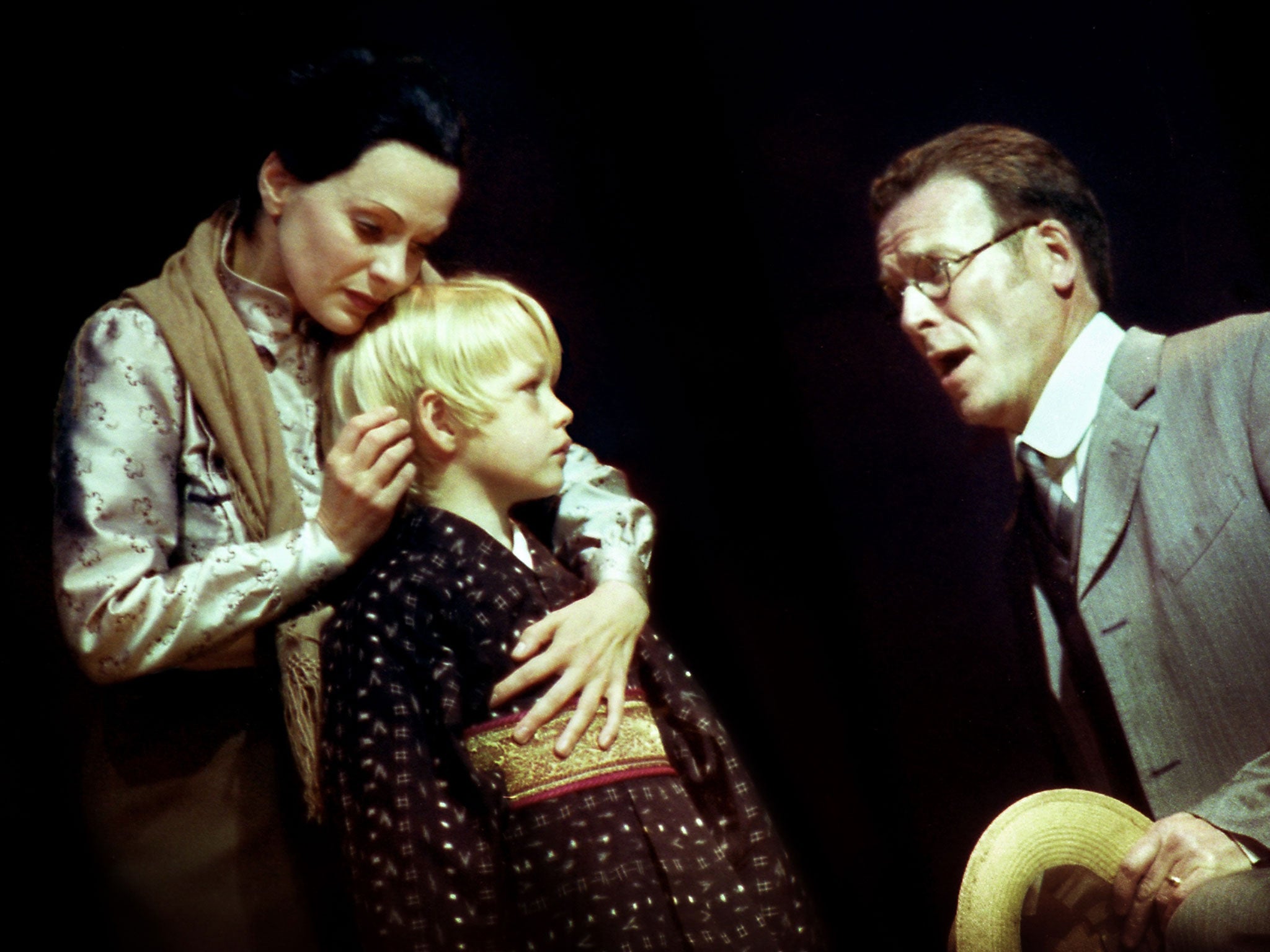Classical review: Madama Butterfly - Head down to the park to see a stunning Butterfly take flight

Paul Higgins's staging of Madama Butterfly is not easy to watch, and nor should it be.
Such prettiness as there is in Puccini's 1904 opera – the Humming Chorus, the Flower Duet, the pointillist touches of harp and flute – only highlights the pitiless severity of a drama in which a teenage geisha is sold to, and abandoned by, an American naval officer, and their child is taken from her. Not a note or a word is wasted. The soundworlds of America and Japan are equally exotic in this French-perfumed Italian score, the first characterised by the bold arpeggio of "The Star-Spangled Banner", the second by brittle pentatonics. In Neil Irish's designs, an empty Shaker chair sits in front of the broad, cool line of shoji screens at the start of Act II. The blossom that falls as Cio-Cio San (Anne Sophie Duprels) waits for the return of Lieutenant Pinkerton (Joseph Wolverton) is soon trampled, its hue as bright as blood.
The tightness of focus in this production is established from the first, throaty scrambling of the City of London Sinfonia's strings under conductor Manlio Benzi, an urgent, urban soundtrack for a commercial transaction between the middle-aged "Yankee vagabondo" Pinkerton and the contemptuous pimp, Goro (Robert Burt). There are two Americas here: the unquestioning, unstoppable, expansionist America of Pinkerton, and the earnest, idealistic America of the consul Sharpless (David Stephenson), who delivers the most important line of Act I: "Be careful, she believes it". To Pinkerton, who pointedly appraises the maid Suzuki (Patricia Orr) as she arrives, Cio-Cio San is merely the most captivating of the fluttering Japanese women in their heavy, ornate costumes. To Sharpless, a more diligent student of a culture in which shame and honour are deeply felt, she is "the voice of sincerity".
Emphasising Cio-Cio San's youth is straightforward if you have a petite soprano. Duprels and Higgins do much more than this. Duprels' Butterfly is half-enchanted by adult sexuality, half-afraid, embittered by poverty, traumatised by her father's suicide, fiercely proud, reckless in her rejection of the old religion, stubborn. The tension between tradition and individuality is striking: while Duprels holds the formal poses of a geisha in Act I, Cio-Cio San's words are notably indiscreet. In Act II, three years later, the semi-Westernised woman who sings "Un bel di" ("One Fine Day") is half-mad with the effort of believing in a marriage that all others know to be a sham. The bloody conclusion of Act III, signalled early, is harrowing. Though the movement direction of the chorus needs refining, this is a Butterfly in which every detail of Puccini's score registers and in which Duprels' vocal lustre, physical energy, candour and sophistication leave you breathless.
Composed of the brightest and best of young European instrumentalists, the conductorless ensemble Spira Mirabilis (Queen Elizabeth Hall, London ***) rehearse a single work for just one week before performing it. Strauss's Metamorphosen, written for 23 solo strings in 1945, is the group's latest project, its quotation of the Funeral March from Beethoven's Eroica Symphony the tonal and stylistic touchstone. Playing of this calibre is intoxicating but with a work of this denseness and complexity, someone needs to impose a more architectural approach. For much of last weekend's performance, a halfway stop in the century-long survey The Rest is Noise, Spira played like a vastly expanded string quartet, democratically but without much flexibility. Clarity and transparency came belatedly, the silence at the end as expressive as the music that had gone before. Was Strauss lamenting the destruction of Dresden's opera house by Allied fire-bombs, or the destruction of an entire culture? We will never really know.
At Spitalfields Festival, the Ukulele Orchestra of Great Britain and Theatre of the Ayre (London ***)enjoyed a very public first date, finding just a little common ground in the music of the lutenist Robert Johnson (c.1583-c.1634) and his blues guitarist namesake (1911-1938). The Devil at the Crossroads mixed songs and dances from Jacobean London and Depression-era Mississippi. Sex and booze featured highly, from "Watkins Ale" to "Hot Tamales", with the three ukuleles, two lutes, plucked double bass, theorbo and baroque guitar sounding like the world's largest – and dirtiest – double harp. Sweetly informal, if a little under-spiced, it was an auspicious start to an improbable liaison.
'Madama Butterfly': to 4 July
Critic's Choice
Three conductors, the LSO and students from top music schools join forces in A Tribute to Sir Colin Davis, with music by Beethoven, Brahms, Berlioz, Mozart and Strauss, at the Barbican, London (Sunday and Tues). Britten's Church Parables come home as Mahogany Opera performs Curlew River (tonight and Tues) at Orford Church, Suffolk.
Subscribe to Independent Premium to bookmark this article
Want to bookmark your favourite articles and stories to read or reference later? Start your Independent Premium subscription today.

Join our commenting forum
Join thought-provoking conversations, follow other Independent readers and see their replies